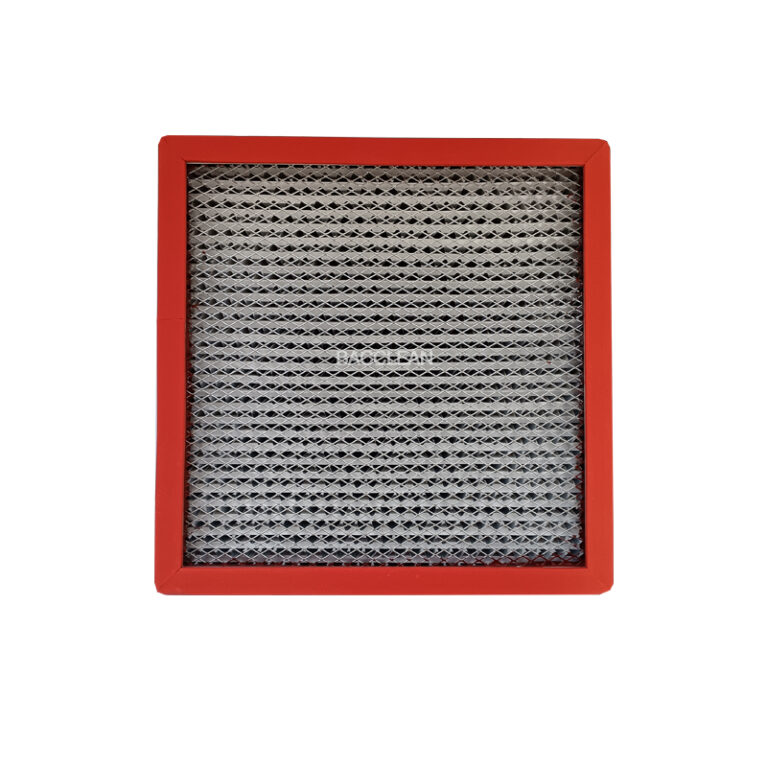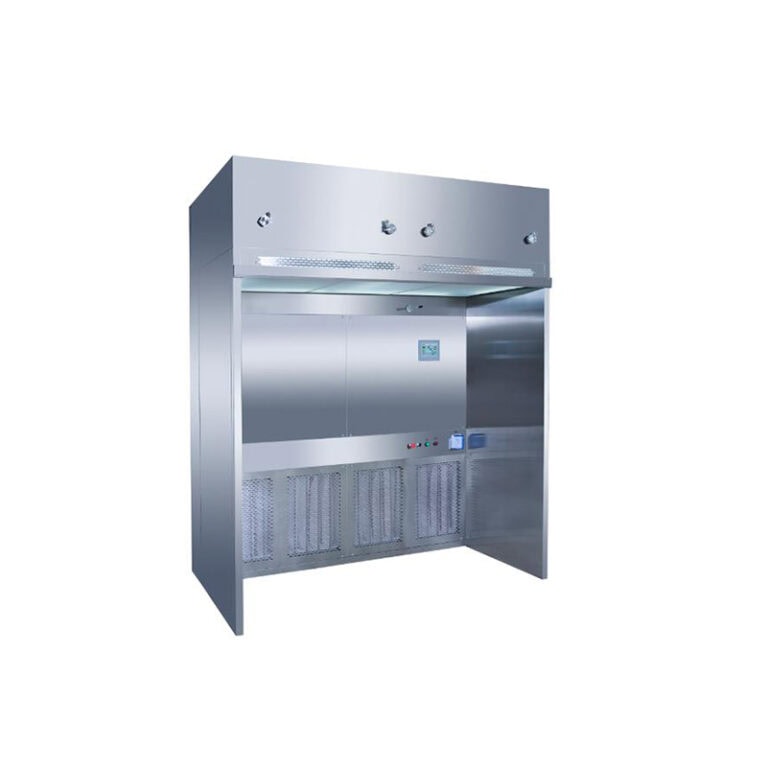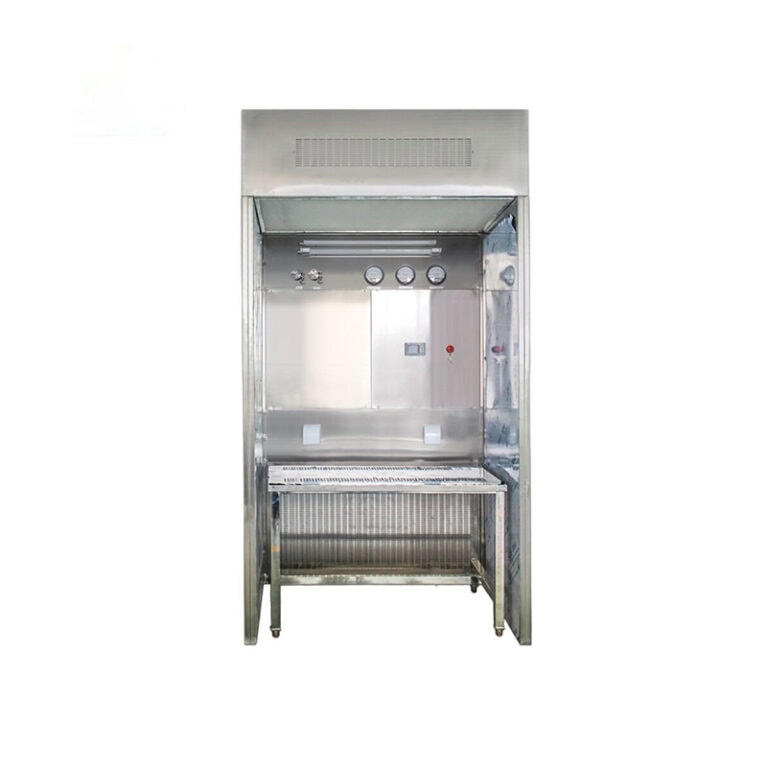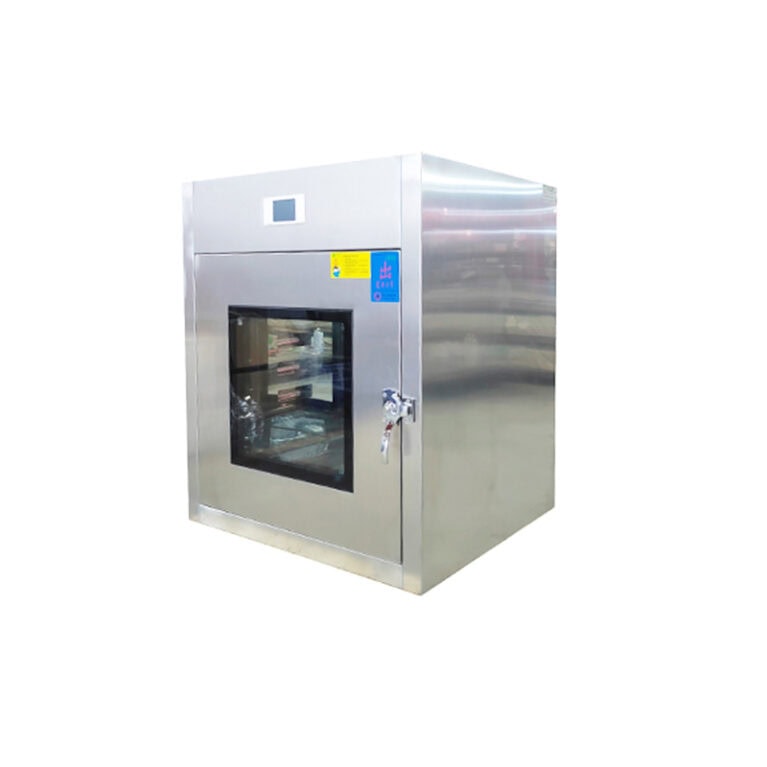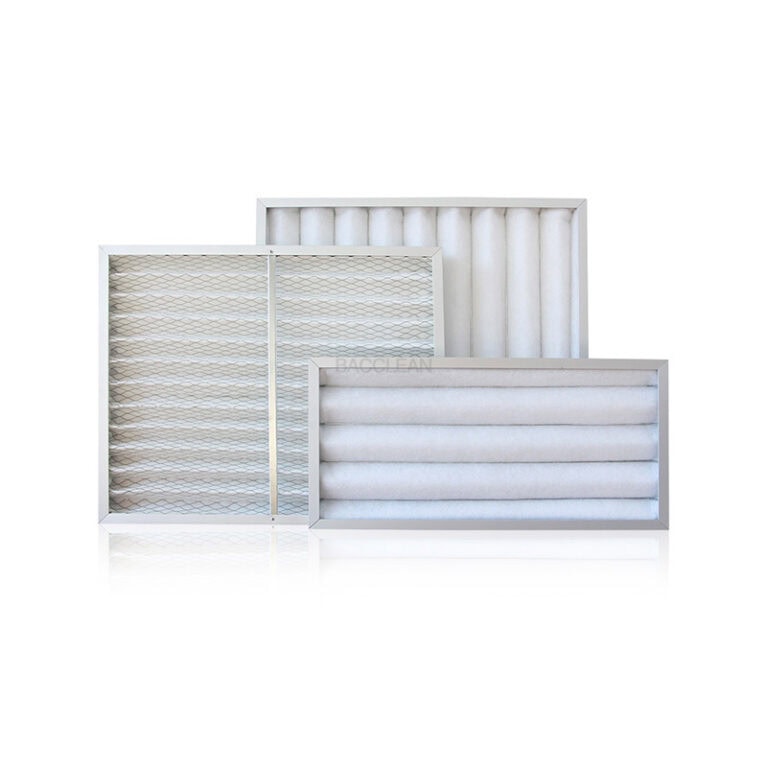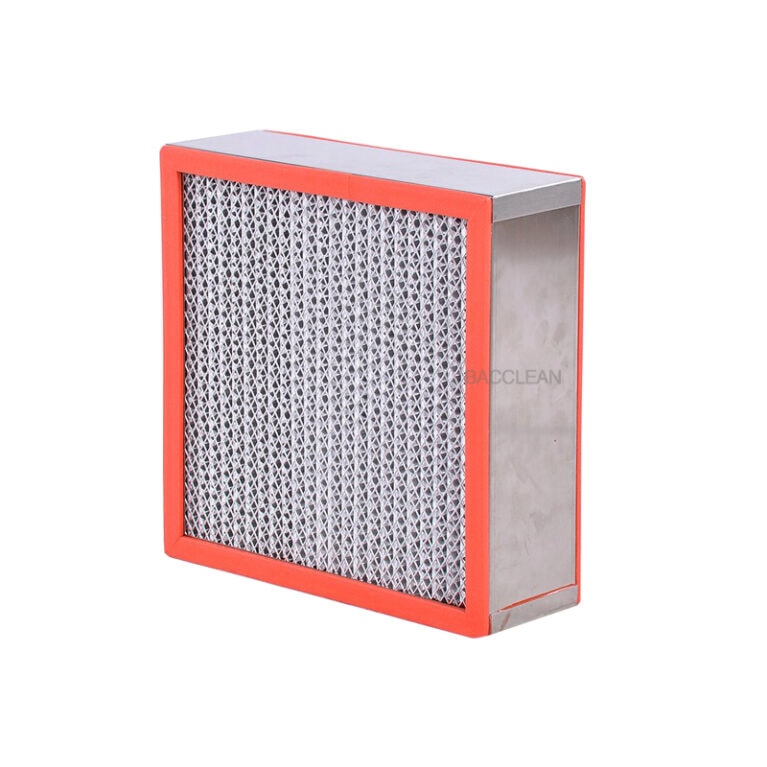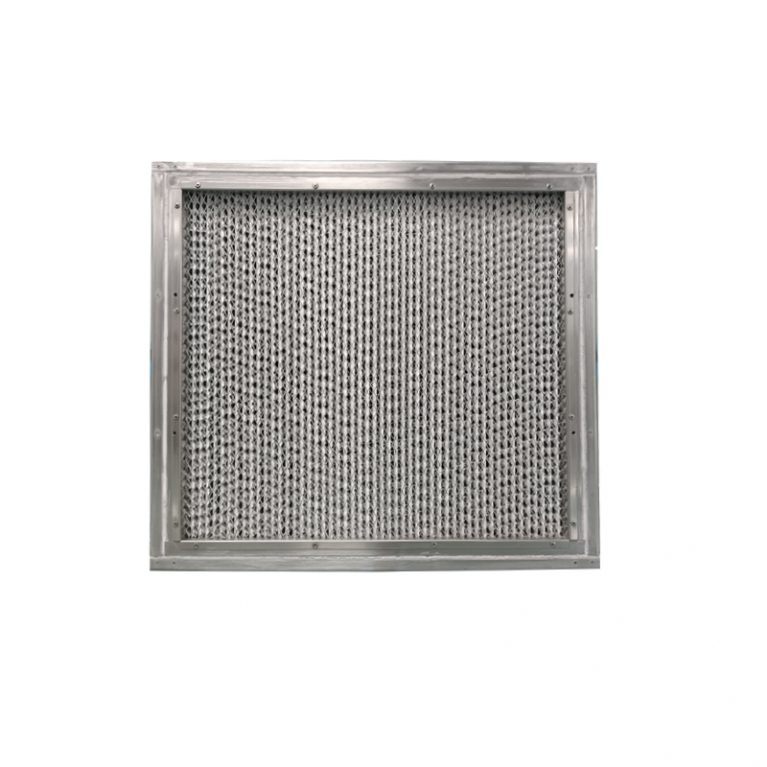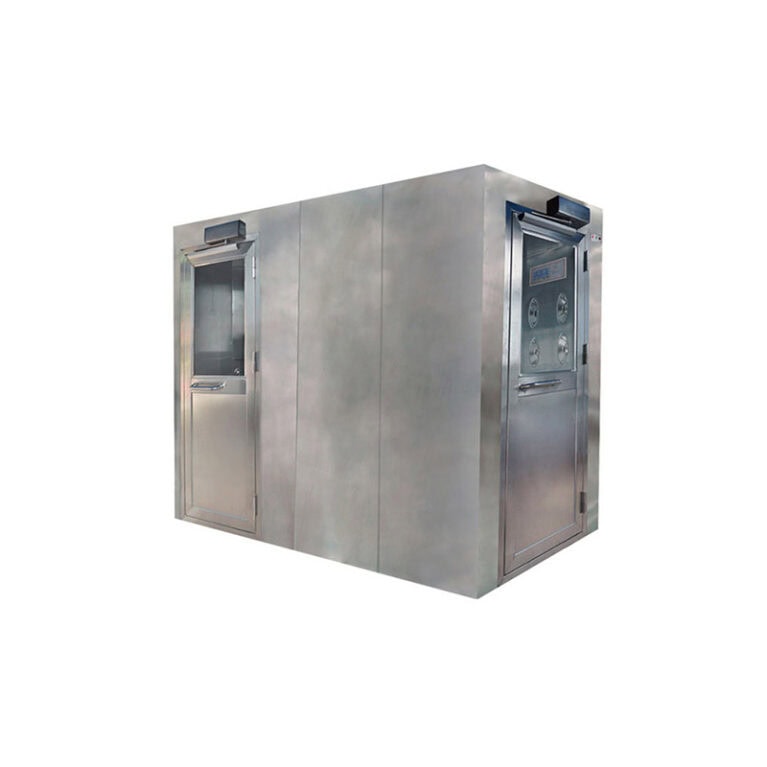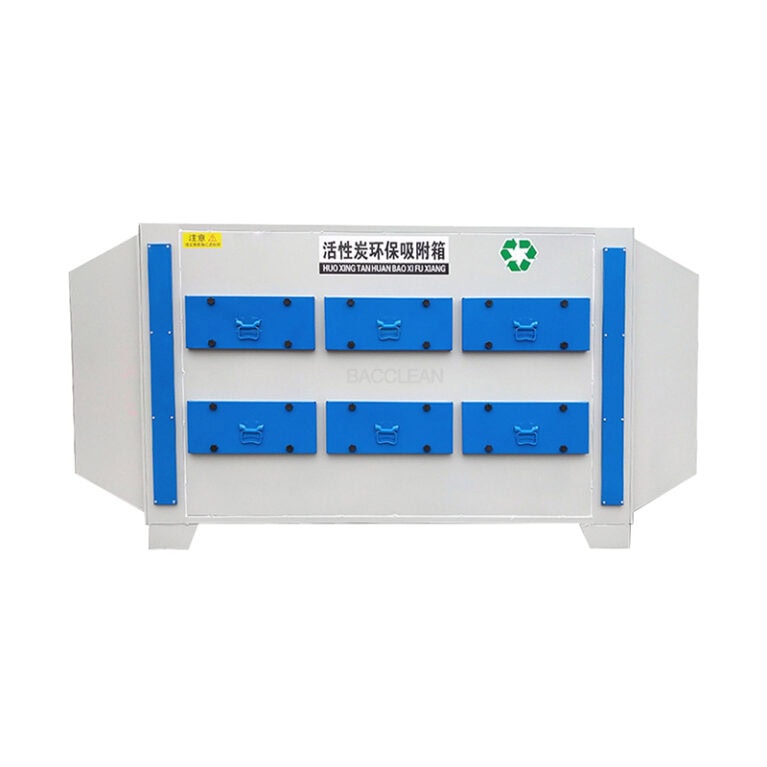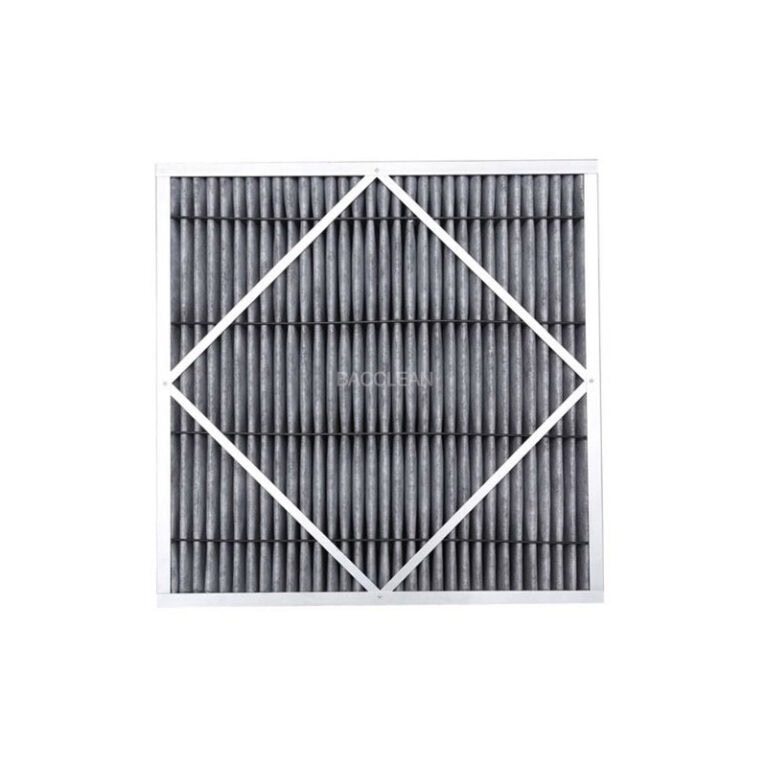في مجال التصنيع الخاص، تكمن القيمة الأساسية لمرشحات الهواء ذات الأكياس المصنوعة من الألياف الزجاجية في قدرتها على تلبية متطلبات النظافة العالية، وتحمل بيئات محددة (مثل درجات الحرارة العالية المحلية والتآكل المنخفض)، وضمان دقة المنتج والامتثال للإنتاج من خلال "الترشيح متوسط الكفاءة" أو "الحماية المسبقة للمرشحات عالية الكفاءة". وهي مناسبة بشكل خاص لسيناريوهات التصنيع الحساسة للغبار والشوائب وتتطلب أداء ترشيح مستقر. ويمكن تصنيف سيناريوهات التطبيق المحددة إلى الفئات الأربع التالية، والتي تغطي مجالات رئيسية مثل أشباه الموصلات الإلكترونية والمستحضرات الصيدلانية والأغذية والفضاء والأجهزة البصرية:
I. تصنيع الإلكترونيات وأشباه الموصلات: ضمان دقة عمليات التصنيع وتجنب النفايات الناتجة عن الغبار
يتطلب تصنيع أشباه الموصلات الإلكترونية متطلبات عالية للغاية لنظافة الهواء (التحكم في الغبار على مستوى الميكرومتر أو حتى النانومتر). وقد أصبحت مرشحات الأكياس المصنوعة من الألياف الزجاجية، مع توليدها المنخفض للغبار ودقة الترشيح المتوسطة إلى العالية الكفاءة، وحدة الترشيح الأساسية، مما يؤثر بشكل مباشر على إنتاجية الرقائق والمكونات.
عمليات تصنيع الرقاقات الأساسية (الطباعة الليثوغرافية الضوئية/النقش/الترسيب
متطلبات المشهد: أثناء عملية الطباعة الليثوغرافية الضوئية، إذا التصقت جزيئات الغبار التي يزيد حجمها عن 0.5 ميكرومتر بسطح رقاقة الرقاقة، فسوف تتسبب مباشرةً في تحول نمط الطباعة الليثوغرافية الضوئية وقصر الدائرة الكهربائية. أثناء الحفر/الترسيب (مثل ترسيب الرقاقة الرقيقة)، يمكن أن تؤدي الشوائب إلى تعطيل توحيد الرقاقة وتؤثر على أداء الرقاقة.
وظيفة الفلتر كوحدة تصفية مسبقة للمرشحات عالية الكفاءة (HEPA/ULPA)، فهي تعترض الغبار والشوائب الليفية التي يتراوح حجمها بين 0.3 و5 ميكرومتر في الهواء (مثل الألياف التي تجلبها أنظمة تكييف الهواء والرمال والأتربة في الهواء الخارجي النقي)، مما يقلل من الحمل على HEPA/ULPA (HEPA مكلف ودورة استبداله قصيرة). يمكن للترشيح المسبق أن يطيل عمر الخدمة بمقدار 30% إلى 50%. وفي الوقت نفسه، فإن مادة مرشح الألياف الزجاجية نفسها لا تحتوي على ألياف متساقطة (توليد غبار منخفض)، مما يجنب تلوث الرقائق بشوائب مواد المرشح، وهي مناسبة للمتطلبات النظيفة للعمليات المتقدمة من 14 نانومتر وما دون (مثل ورش العمل النظيفة في TSMC وSMIC).
تغليف المكونات الإلكترونية (الصمام الثنائي الباعث للضوء/المصباح الثنائي الباعث للضوء/المستشعر)
عند تعبئة مصابيح LED، إذا التصق غبار اللحام أو جزيئات الراتنج بدبابيس الرقاقة أو طبقة الفوسفور، فسوف يتسبب ذلك في توهين السطوع وانطفاء الأضواء. في تغليف الدوائر المتكاملة (مثل مصفوفات الشبكة الكروية BGA)، يمكن أن تتسبب الشوائب الصغيرة في حدوث لحام خاطئ للدبابيس وفقاعات العبوة، مما يؤثر على موثوقية المكونات.
وظيفة الفلتر: يتم تثبيته في نظام التهوية الدائر لورشة التعبئة والتغليف، وهو يلتقط بكفاءة غبار اللحام (1-3 ميكرومتر) وحطام الراتنج. وفي الوقت نفسه، يمكنه تحمل درجات الحرارة العالية المحلية أثناء عملية التعبئة والتغليف (مثل 180-220 ℃ أثناء اللحام)، مما يمنع تشوه كيس الفلتر ويضمن كفاءة ترشيح مستقرة (يمكن أن تصل كفاءة الترشيح إلى درجة F8-F9، وكفاءة الاعتراض ≥95%@0.5μm).
II. تصنيع الأدوية والأغذية: الامتثال لمعايير الامتثال، ومراقبة الكائنات الدقيقة والشوائب
يجب أن يتوافق تصنيع الأدوية والأغذية مع معايير الصناعة الصارمة (مثل ممارسات التصنيع الجيدة والمعايير الوطنية لسلامة الأغذية). تضمن فلاتر الأكياس المصنوعة من الألياف الزجاجية بيئة إنتاج "معقمة وخالية من الشوائب" من خلال اعتراض الغبار بكفاءة ومقاومة التطهير ودرجات الحرارة المرتفعة المحلية.
منطقة تنظيف المستحضرات الصيدلانية (إنتاج الأدوية المعقمة/المضادات الحيوية
يجب أن يتم إنتاج المضادات الحيوية (مثل البنسلين) واللقاحات في منطقة نظيفة من الفئة D أو أعلى. يمكن أن يتسبب الغبار والناقلات الميكروبية في الهواء (مثل البكتيريا الملتصقة بالغبار) في تلوث الأدوية وتخريد الدفعات. وفي الوقت نفسه، ستؤدي بعض العمليات (مثل التجفيف والتعقيم) إلى توليد درجات حرارة عالية محلية (120-180 درجة مئوية).
وظيفة الفلتر باعتباره جوهر الترشيح متوسط الكفاءة في نظام التهوية في المناطق النظيفة، فإنه يعترض الغبار والناقلات الميكروبية الأكبر من 5 ميكرومتر في الهواء النقي أو الهواء المعاد تدويره, يوفر "حماية مسبقة" للترشيح اللاحق عالي الكفاءة (مثل HEPA في خزانات السلامة البيولوجية وخطوط التعبئة المعقمة) يتوافق مع متطلبات "الجسيمات المحمولة جواً" المنصوص عليها في "ممارسات التصنيع الجيدة (GMP) للمنتجات الصيدلانية" (على سبيل المثال، عدد الجسيمات ≥5 ميكرومتر في المنطقة النظيفة من الفئة D هو ≤ 290,000 لكل متر مكعب). يمكن تكييف بعض النماذج المقاومة للتعقيم (القادرة على تحمل تبخير الفورمالديهايد وبيروكسيد الهيدروجين) مع احتياجات التطهير المنتظم للمناطق المعقمة، مما يمنع نمو الكائنات الحية الدقيقة على مواد الترشيح.
معالجة الأغذية في درجات حرارة عالية (الخبز/التجفيف بالرش)
عند خبز البسكويت وتجفيف الحليب المجفف بالرش، يتم إنتاج غبار الطعام (مثل جزيئات الدقيق وجزيئات الحليب المجفف) في درجات حرارة عالية (120-200 درجة مئوية). إذا تم تفريغه مباشرة، فسوف يتسبب في تلوث الهواء. وإذا دخل إلى نظام تكييف الهواء، فسوف يؤدي إلى تلوث متبادل في الورشة (مثل اختلاط غبار الدقيق بمسحوق الحليب المجفف).
وظيفة الفلتر: يتم تثبيته في مجرى العادم في الورشة، وهو يلتقط غبار الطعام بكفاءة (كفاءة الترشيح بدرجة F7، ≥80%@0.5μm) من خلال الاستفادة من مقاومة درجة حرارة مادة مرشح الألياف الزجاجية (أعلى من 200 درجة مئوية)، مما يمنع انبعاثات الغبار من تجاوز المعيار (بما يتوافق مع "معيار الانبعاثات المتكاملة لملوثات الهواء" GB 16297). وفي الوقت نفسه، لا تحتوي مادة المرشح على رائحة ولا مواد مهاجرة، ولن تلوث الطعام، وتفي بمتطلبات سلامة الأغذية.
ثالثًا: ثالثًا. تصنيع معدات الفضاء والمعدات المتطورة: مناسب للمعالجة الدقيقة ومقاوم لظروف العمل الخاصة
المكونات في مجال الفضاء الجوي وتصنيع المعدات المتطورة (مثل شفرات التوربينات والمحامل الدقيقة) لها متطلبات صارمة "لدقة الأبعاد وتشطيب السطح"، وقد تكون مصحوبة بدرجات حرارة عالية محلية وبيئات ضباب الزيت. يمكن لمرشحات أكياس الألياف الزجاجية أن تلبي احتياجات الترشيح هذه على وجه التحديد
معالجة مكونات المحركات الهوائية/التوربينات الغازية
عند معالجة شفرات التوربينات (المصنوعة من مواد السبائك المقاومة للحرارة العالية)، سينتج عن القطع المعدني برادة سبيكة (مثل سبائك التيتانيوم والسبائك القائمة على النيكل) من 1-10 ميكرومتر. إذا التصقت بسطح الشفرة، فسيؤثر ذلك على دقة الطحن اللاحقة (يجب التحكم في تفاوت الشفرة في حدود 0.01 مم). وفي الوقت نفسه، سيتم إنتاج كمية صغيرة من رذاذ الزيت (ترذيذ سائل القطع) أثناء عملية القطع، وهو ما يكون عرضة لانسداد مواد التصفية العادية.
وظيفة الفلتر: في نظام التهوية النظيفة لورشة المعالجة، فإنه يعترض الحطام المعدني لمنعه من دخول أداة الماكينة أو الالتصاق بسطح المكونات. يمكن أن تتكيف خاصية مقاومة الزيت ومقاومة الانسداد لمادة فلتر الألياف الزجاجية (مع قدرة احتجاز الغبار 20%-30% أعلى من مادة فلتر البوليستر العادية) مع بيئات ضباب الزيت، وتقليل تكرار استبدال الفلتر، وضمان استمرار الإنتاج.
أدوات عالية الدقة (مستشعرات/محركات دقيقة)
أثناء عملية تجميع مستشعرات MEMS (مثل جيروسكوبات الهواتف المحمولة) والمحركات الدقيقة (مثل محركات الطائرات بدون طيار)، يمكن أن تتسبب جزيئات الغبار التي يتراوح حجمها من 0.1 إلى 1 ميكرومتر في تشويش المكونات وانحراف الإشارة. يمكن أن تولد بعض عمليات لف المحركات درجات حرارة عالية محلية (مثل 150 درجة مئوية عند تجفيف الورنيش العازل).
وظيفة المرشح: كوحدة ترشيح متوسطة الكفاءة في ورشة التجميع، فإنها تعترض الغبار الناعم، وفي الوقت نفسه، يمكنها تحمل درجات الحرارة العالية المحلية لمنع مادة المرشح من التشوه أو إطلاق المواد الضارة، مما يضمن دقة الجهاز (على سبيل المثال، يجب أن يكون خطأ القياس لمستشعر MEMS ≤0.001 مم).
آي في. البصريات وتصنيع الطاقة الجديدة: التحكم في الشوائب الصغيرة لضمان أداء المنتج
الأجهزة البصرية ومنتجات الطاقة الجديدة حساسة "لنظافة السطح ونقاء المواد". وتمنع مرشحات الأكياس المصنوعة من الألياف الزجاجية، من خلال الترشيح عالي الدقة وخصائص التلوث المنخفضة، الشوائب من التأثير على الوظائف الأساسية للمنتجات
تصنيع الأدوات البصرية (العدسات/أجهزة الليزر)
متطلبات المشهد: أثناء عملية الطلاء/التلميع لعدسات الكاميرا وعدسات الليدار، ستلتصق جزيئات الغبار التي يزيد حجمها عن 0.3 ميكرومتر بسطح العدسات، مما يؤدي إلى انخفاض نفاذية الضوء (على سبيل المثال، يجب أن تكون نفاذية الضوء للعدسة ≥99.5%) وتشتت الليزر. كما أن درجة الحرارة العالية لمصدر التبخير أثناء الطلاء (أعلى من 200 ℃ في بعض المناطق) لها متطلبات لمقاومة الحرارة لمادة المرشح.
وظيفة المرشح: يتم تثبيته في نظام التهوية في ورشة العمل النظيفة البصرية، وهو يعترض بكفاءة جزيئات الغبار التي تتراوح من 0.3 إلى 1 ميكرومتر (كفاءة الترشيح بدرجة H10، ≥95%@0.3μm). وفي الوقت نفسه، لا تحتوي مادة مرشح الألياف الزجاجية على أي مواد متطايرة ولا تتساقط الألياف، مما يمنع تلوث سطح العدسة. يمكن أن تتكيف خاصية مقاومة درجات الحرارة العالية المحلية مع المتطلبات البيئية لعملية الطلاء.
تصنيع مواد الطاقة الجديدة (بطاريات الليثيوم/الوحدات الكهروضوئية)
متطلبات المشهد: عند خلط مواد كاثود بطارية الليثيوم (مثل المواد الثلاثية)، سيتم إنتاج 1-5 ميكرومتر من المسحوق. إذا تم خلطها في خلايا البطارية، فسوف تتسبب في حدوث دوائر قصر داخلية. عند لحام الوحدات الكهروضوئية (الخلايا الشمسية)، يمكن أن يؤثر الغبار من شريط اللحام والحطام الزجاجي على توصيل الخلايا الشمسية ويقلل من كفاءة تحويل الألواح الكهروضوئية (والتي يجب التحكم فيها فوق 23%).
وظيفة المرشح: في أنظمة التهوية لورشة خلط المواد وورشة تجميع المكونات، فإنه يعترض مسحوق مواد الكاثود وغبار شرائط اللحام، مما يمنعها من الانتشار إلى عمليات أخرى (مثل تغليف خلايا البطارية). يمكن تكييف الثبات الكيميائي لمادة مرشح الألياف الزجاجية (المقاومة لتآكل ملح الليثيوم في الإلكتروليت) مع البيئة المسببة للتآكل قليلاً في ورش عمل بطاريات الليثيوم، وبالتالي إطالة عمر خدمة المرشح.
ملخص: المنطق الأساسي للتطبيقات في مجالات التصنيع الخاصة
يكمن تطبيق فلاتر الأكياس المصنوعة من الألياف الزجاجية في مجالات التصنيع الخاصة بشكل أساسي في "تلبية المتطلبات الخاصة للسيناريوهات مع "القدرة على التكيف البيئي" وضمان جودة المنتج مع "الترشيح عالي الدقة". وتنعكس مزاياها التي لا يمكن الاستغناء عنها في ثلاثة جوانب:
توافق الأداء: يمكن أن تغطي دقة الترشيح متوسطة وعالية الكفاءة (درجة F7-H10) غبار 0.3-5 ميكرومتر، مما يلبي متطلبات النظافة في التصنيع الدقيق.
مقاومة بيئية: مقاوم لدرجات الحرارة العالية من 200-300 درجة مئوية، والتآكل الخفيف، وضباب الزيت، مما يحل مشاكل "سهولة التشوه والانسداد السهل" لمواد المرشح الشائعة (مثل البوليستر) في ظل ظروف العمل الخاصة.
الامتثال: توليد غبار منخفض، وعدم وجود مواد مهاجرة، بما يتماشى مع معايير الصناعة في مجالات مثل الإلكترونيات والمستحضرات الصيدلانية والأغذية (مثل GMP، ومعايير نظافة أشباه الموصلات)، مما يمنع مادة المرشح نفسها من أن تصبح مصدرًا للتلوث.
عند إجراء الاختيار، من الضروري التركيز على مطابقة مستوى نظافة المشهد (مثل F8 أو H10)، ونطاق درجة الحرارة (مثل ما إذا كان يتجاوز 200 درجة مئوية)، وما إذا كان هناك تآكل/ضباب زيتي، لضمان توافق المرشح بدقة مع عملية التصنيع.
I. تصنيع الإلكترونيات وأشباه الموصلات: ضمان دقة عمليات التصنيع وتجنب النفايات الناتجة عن الغبار
يتطلب تصنيع أشباه الموصلات الإلكترونية متطلبات عالية للغاية لنظافة الهواء (التحكم في الغبار على مستوى الميكرومتر أو حتى النانومتر). وقد أصبحت مرشحات الأكياس المصنوعة من الألياف الزجاجية، مع توليدها المنخفض للغبار ودقة الترشيح المتوسطة إلى العالية الكفاءة، وحدة الترشيح الأساسية، مما يؤثر بشكل مباشر على إنتاجية الرقائق والمكونات.
عمليات تصنيع الرقاقات الأساسية (الطباعة الليثوغرافية الضوئية/النقش/الترسيب
متطلبات المشهد: أثناء عملية الطباعة الليثوغرافية الضوئية، إذا التصقت جزيئات الغبار التي يزيد حجمها عن 0.5 ميكرومتر بسطح رقاقة الرقاقة، فسوف تتسبب مباشرةً في تحول نمط الطباعة الليثوغرافية الضوئية وقصر الدائرة الكهربائية. أثناء الحفر/الترسيب (مثل ترسيب الرقاقة الرقيقة)، يمكن أن تؤدي الشوائب إلى تعطيل توحيد الرقاقة وتؤثر على أداء الرقاقة.
وظيفة الفلتر كوحدة تصفية مسبقة للمرشحات عالية الكفاءة (HEPA/ULPA)، فهي تعترض الغبار والشوائب الليفية التي يتراوح حجمها بين 0.3 و5 ميكرومتر في الهواء (مثل الألياف التي تجلبها أنظمة تكييف الهواء والرمال والأتربة في الهواء الخارجي النقي)، مما يقلل من الحمل على HEPA/ULPA (HEPA مكلف ودورة استبداله قصيرة). يمكن للترشيح المسبق أن يطيل عمر الخدمة بمقدار 30% إلى 50%. وفي الوقت نفسه، فإن مادة مرشح الألياف الزجاجية نفسها لا تحتوي على ألياف متساقطة (توليد غبار منخفض)، مما يجنب تلوث الرقائق بشوائب مواد المرشح، وهي مناسبة للمتطلبات النظيفة للعمليات المتقدمة من 14 نانومتر وما دون (مثل ورش العمل النظيفة في TSMC وSMIC).
تغليف المكونات الإلكترونية (الصمام الثنائي الباعث للضوء/المصباح الثنائي الباعث للضوء/المستشعر)
عند تعبئة مصابيح LED، إذا التصق غبار اللحام أو جزيئات الراتنج بدبابيس الرقاقة أو طبقة الفوسفور، فسوف يتسبب ذلك في توهين السطوع وانطفاء الأضواء. في تغليف الدوائر المتكاملة (مثل مصفوفات الشبكة الكروية BGA)، يمكن أن تتسبب الشوائب الصغيرة في حدوث لحام خاطئ للدبابيس وفقاعات العبوة، مما يؤثر على موثوقية المكونات.
وظيفة الفلتر: يتم تثبيته في نظام التهوية الدائر لورشة التعبئة والتغليف، وهو يلتقط بكفاءة غبار اللحام (1-3 ميكرومتر) وحطام الراتنج. وفي الوقت نفسه، يمكنه تحمل درجات الحرارة العالية المحلية أثناء عملية التعبئة والتغليف (مثل 180-220 ℃ أثناء اللحام)، مما يمنع تشوه كيس الفلتر ويضمن كفاءة ترشيح مستقرة (يمكن أن تصل كفاءة الترشيح إلى درجة F8-F9، وكفاءة الاعتراض ≥95%@0.5μm).
II. تصنيع الأدوية والأغذية: الامتثال لمعايير الامتثال، ومراقبة الكائنات الدقيقة والشوائب
يجب أن يتوافق تصنيع الأدوية والأغذية مع معايير الصناعة الصارمة (مثل ممارسات التصنيع الجيدة والمعايير الوطنية لسلامة الأغذية). تضمن فلاتر الأكياس المصنوعة من الألياف الزجاجية بيئة إنتاج "معقمة وخالية من الشوائب" من خلال اعتراض الغبار بكفاءة ومقاومة التطهير ودرجات الحرارة المرتفعة المحلية.
منطقة تنظيف المستحضرات الصيدلانية (إنتاج الأدوية المعقمة/المضادات الحيوية
يجب أن يتم إنتاج المضادات الحيوية (مثل البنسلين) واللقاحات في منطقة نظيفة من الفئة D أو أعلى. يمكن أن يتسبب الغبار والناقلات الميكروبية في الهواء (مثل البكتيريا الملتصقة بالغبار) في تلوث الأدوية وتخريد الدفعات. وفي الوقت نفسه، ستؤدي بعض العمليات (مثل التجفيف والتعقيم) إلى توليد درجات حرارة عالية محلية (120-180 درجة مئوية).
وظيفة الفلتر باعتباره جوهر الترشيح متوسط الكفاءة في نظام التهوية في المناطق النظيفة، فإنه يعترض الغبار والناقلات الميكروبية الأكبر من 5 ميكرومتر في الهواء النقي أو الهواء المعاد تدويره, يوفر "حماية مسبقة" للترشيح اللاحق عالي الكفاءة (مثل HEPA في خزانات السلامة البيولوجية وخطوط التعبئة المعقمة) يتوافق مع متطلبات "الجسيمات المحمولة جواً" المنصوص عليها في "ممارسات التصنيع الجيدة (GMP) للمنتجات الصيدلانية" (على سبيل المثال، عدد الجسيمات ≥5 ميكرومتر في المنطقة النظيفة من الفئة D هو ≤ 290,000 لكل متر مكعب). يمكن تكييف بعض النماذج المقاومة للتعقيم (القادرة على تحمل تبخير الفورمالديهايد وبيروكسيد الهيدروجين) مع احتياجات التطهير المنتظم للمناطق المعقمة، مما يمنع نمو الكائنات الحية الدقيقة على مواد الترشيح.
معالجة الأغذية في درجات حرارة عالية (الخبز/التجفيف بالرش)
عند خبز البسكويت وتجفيف الحليب المجفف بالرش، يتم إنتاج غبار الطعام (مثل جزيئات الدقيق وجزيئات الحليب المجفف) في درجات حرارة عالية (120-200 درجة مئوية). إذا تم تفريغه مباشرة، فسوف يتسبب في تلوث الهواء. وإذا دخل إلى نظام تكييف الهواء، فسوف يؤدي إلى تلوث متبادل في الورشة (مثل اختلاط غبار الدقيق بمسحوق الحليب المجفف).
وظيفة الفلتر: يتم تثبيته في مجرى العادم في الورشة، وهو يلتقط غبار الطعام بكفاءة (كفاءة الترشيح بدرجة F7، ≥80%@0.5μm) من خلال الاستفادة من مقاومة درجة حرارة مادة مرشح الألياف الزجاجية (أعلى من 200 درجة مئوية)، مما يمنع انبعاثات الغبار من تجاوز المعيار (بما يتوافق مع "معيار الانبعاثات المتكاملة لملوثات الهواء" GB 16297). وفي الوقت نفسه، لا تحتوي مادة المرشح على رائحة ولا مواد مهاجرة، ولن تلوث الطعام، وتفي بمتطلبات سلامة الأغذية.
ثالثًا: ثالثًا. تصنيع معدات الفضاء والمعدات المتطورة: مناسب للمعالجة الدقيقة ومقاوم لظروف العمل الخاصة
المكونات في مجال الفضاء الجوي وتصنيع المعدات المتطورة (مثل شفرات التوربينات والمحامل الدقيقة) لها متطلبات صارمة "لدقة الأبعاد وتشطيب السطح"، وقد تكون مصحوبة بدرجات حرارة عالية محلية وبيئات ضباب الزيت. يمكن لمرشحات أكياس الألياف الزجاجية أن تلبي احتياجات الترشيح هذه على وجه التحديد
معالجة مكونات المحركات الهوائية/التوربينات الغازية
عند معالجة شفرات التوربينات (المصنوعة من مواد السبائك المقاومة للحرارة العالية)، سينتج عن القطع المعدني برادة سبيكة (مثل سبائك التيتانيوم والسبائك القائمة على النيكل) من 1-10 ميكرومتر. إذا التصقت بسطح الشفرة، فسيؤثر ذلك على دقة الطحن اللاحقة (يجب التحكم في تفاوت الشفرة في حدود 0.01 مم). وفي الوقت نفسه، سيتم إنتاج كمية صغيرة من رذاذ الزيت (ترذيذ سائل القطع) أثناء عملية القطع، وهو ما يكون عرضة لانسداد مواد التصفية العادية.
وظيفة الفلتر: في نظام التهوية النظيفة لورشة المعالجة، فإنه يعترض الحطام المعدني لمنعه من دخول أداة الماكينة أو الالتصاق بسطح المكونات. يمكن أن تتكيف خاصية مقاومة الزيت ومقاومة الانسداد لمادة فلتر الألياف الزجاجية (مع قدرة احتجاز الغبار 20%-30% أعلى من مادة فلتر البوليستر العادية) مع بيئات ضباب الزيت، وتقليل تكرار استبدال الفلتر، وضمان استمرار الإنتاج.
أدوات عالية الدقة (مستشعرات/محركات دقيقة)
أثناء عملية تجميع مستشعرات MEMS (مثل جيروسكوبات الهواتف المحمولة) والمحركات الدقيقة (مثل محركات الطائرات بدون طيار)، يمكن أن تتسبب جزيئات الغبار التي يتراوح حجمها من 0.1 إلى 1 ميكرومتر في تشويش المكونات وانحراف الإشارة. يمكن أن تولد بعض عمليات لف المحركات درجات حرارة عالية محلية (مثل 150 درجة مئوية عند تجفيف الورنيش العازل).
وظيفة المرشح: كوحدة ترشيح متوسطة الكفاءة في ورشة التجميع، فإنها تعترض الغبار الناعم، وفي الوقت نفسه، يمكنها تحمل درجات الحرارة العالية المحلية لمنع مادة المرشح من التشوه أو إطلاق المواد الضارة، مما يضمن دقة الجهاز (على سبيل المثال، يجب أن يكون خطأ القياس لمستشعر MEMS ≤0.001 مم).
آي في. البصريات وتصنيع الطاقة الجديدة: التحكم في الشوائب الصغيرة لضمان أداء المنتج
الأجهزة البصرية ومنتجات الطاقة الجديدة حساسة "لنظافة السطح ونقاء المواد". وتمنع مرشحات الأكياس المصنوعة من الألياف الزجاجية، من خلال الترشيح عالي الدقة وخصائص التلوث المنخفضة، الشوائب من التأثير على الوظائف الأساسية للمنتجات
تصنيع الأدوات البصرية (العدسات/أجهزة الليزر)
متطلبات المشهد: أثناء عملية الطلاء/التلميع لعدسات الكاميرا وعدسات الليدار، ستلتصق جزيئات الغبار التي يزيد حجمها عن 0.3 ميكرومتر بسطح العدسات، مما يؤدي إلى انخفاض نفاذية الضوء (على سبيل المثال، يجب أن تكون نفاذية الضوء للعدسة ≥99.5%) وتشتت الليزر. كما أن درجة الحرارة العالية لمصدر التبخير أثناء الطلاء (أعلى من 200 ℃ في بعض المناطق) لها متطلبات لمقاومة الحرارة لمادة المرشح.
وظيفة المرشح: يتم تثبيته في نظام التهوية في ورشة العمل النظيفة البصرية، وهو يعترض بكفاءة جزيئات الغبار التي تتراوح من 0.3 إلى 1 ميكرومتر (كفاءة الترشيح بدرجة H10، ≥95%@0.3μm). وفي الوقت نفسه، لا تحتوي مادة مرشح الألياف الزجاجية على أي مواد متطايرة ولا تتساقط الألياف، مما يمنع تلوث سطح العدسة. يمكن أن تتكيف خاصية مقاومة درجات الحرارة العالية المحلية مع المتطلبات البيئية لعملية الطلاء.
تصنيع مواد الطاقة الجديدة (بطاريات الليثيوم/الوحدات الكهروضوئية)
متطلبات المشهد: عند خلط مواد كاثود بطارية الليثيوم (مثل المواد الثلاثية)، سيتم إنتاج 1-5 ميكرومتر من المسحوق. إذا تم خلطها في خلايا البطارية، فسوف تتسبب في حدوث دوائر قصر داخلية. عند لحام الوحدات الكهروضوئية (الخلايا الشمسية)، يمكن أن يؤثر الغبار من شريط اللحام والحطام الزجاجي على توصيل الخلايا الشمسية ويقلل من كفاءة تحويل الألواح الكهروضوئية (والتي يجب التحكم فيها فوق 23%).
وظيفة المرشح: في أنظمة التهوية لورشة خلط المواد وورشة تجميع المكونات، فإنه يعترض مسحوق مواد الكاثود وغبار شرائط اللحام، مما يمنعها من الانتشار إلى عمليات أخرى (مثل تغليف خلايا البطارية). يمكن تكييف الثبات الكيميائي لمادة مرشح الألياف الزجاجية (المقاومة لتآكل ملح الليثيوم في الإلكتروليت) مع البيئة المسببة للتآكل قليلاً في ورش عمل بطاريات الليثيوم، وبالتالي إطالة عمر خدمة المرشح.
ملخص: المنطق الأساسي للتطبيقات في مجالات التصنيع الخاصة
يكمن تطبيق فلاتر الأكياس المصنوعة من الألياف الزجاجية في مجالات التصنيع الخاصة بشكل أساسي في "تلبية المتطلبات الخاصة للسيناريوهات مع "القدرة على التكيف البيئي" وضمان جودة المنتج مع "الترشيح عالي الدقة". وتنعكس مزاياها التي لا يمكن الاستغناء عنها في ثلاثة جوانب:
توافق الأداء: يمكن أن تغطي دقة الترشيح متوسطة وعالية الكفاءة (درجة F7-H10) غبار 0.3-5 ميكرومتر، مما يلبي متطلبات النظافة في التصنيع الدقيق.
مقاومة بيئية: مقاوم لدرجات الحرارة العالية من 200-300 درجة مئوية، والتآكل الخفيف، وضباب الزيت، مما يحل مشاكل "سهولة التشوه والانسداد السهل" لمواد المرشح الشائعة (مثل البوليستر) في ظل ظروف العمل الخاصة.
الامتثال: توليد غبار منخفض، وعدم وجود مواد مهاجرة، بما يتماشى مع معايير الصناعة في مجالات مثل الإلكترونيات والمستحضرات الصيدلانية والأغذية (مثل GMP، ومعايير نظافة أشباه الموصلات)، مما يمنع مادة المرشح نفسها من أن تصبح مصدرًا للتلوث.
عند إجراء الاختيار، من الضروري التركيز على مطابقة مستوى نظافة المشهد (مثل F8 أو H10)، ونطاق درجة الحرارة (مثل ما إذا كان يتجاوز 200 درجة مئوية)، وما إذا كان هناك تآكل/ضباب زيتي، لضمان توافق المرشح بدقة مع عملية التصنيع.

